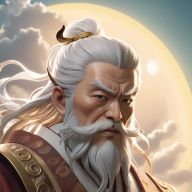DescriptionGao is the God of Time, Air, and Harvest, revered across the Nagan Empire and beyond as the guardian of the natural cycle of life. He is often depicted holding an hourglass, symbolizing his dominion over time, and is said to have the ability to manipulate the flow of moments for those who act righteously. Those who have performed virtuous deeds may receive a fleeting boon—a moment to act decisively in battle, to survive peril, or to spend their final seconds with loved ones.
During the harvest season, Gao is believed to traverse the lands of Lunora, ensuring that crops flourish and that the balance of life is maintained. His followers seek his favor to gain insight, guidance, and fortune, trusting in his wisdom to safeguard their labors and provide abundance. Gao’s presence is both a stabilizing force and a reminder that time is a gift, precious and fleeting. Dragon FormLike the other gods of the Nagan Pantheon, Gao can assume the form of an oriental dragon, representing his strength, prosperity, and control over natural cycles. In this form, he is covered in golden scales that gleam like sunlight over ripening fields. His sharp claws and regal bearing convey authority, while his majestic and flowing body evoke the movement of wind across the land.
His dragon form is closely associated with the harvest season, symbolizing the winds that scatter seeds, the rains that nourish the soil, and the abundance that follows diligent care. To Gao’s followers, invoking his dragon form is a plea for strength, prosperity, and the ability to act wisely within the flow of time. Across Lunora, dragons are widely regarded as symbols of power, good fortune, and protection, and Gao’s draconic manifestation embodies all three: the bounty of the harvest, the foresight to prepare, and the endurance to persevere through challenges. HistoryGao is believed to have been created first among The Five, born from the flesh of Diion during his imprisonment. Charged with maintaining the flow of time and the cycles of nature, Gao assumed the role of eternal warden at the dawn of the Fourth Age. Unlike his siblings, whose domains focus on growth, love, or death, Gao embodies the continuum itself: the orderly rhythm of seasons, the inevitability of harvest, and the impartiality of time.
Gao’s influence have shaped the mortal world. Farmers prayed for his guidance, warriors acknowledged the timing of his hand, and rulers respected the unseen clockwork that underpinned all endeavors. While distant and impartial, Gao’s presence ensured that life, death, prosperity, and decay followed their proper course, anchoring the natural and social order alike. PersonalityGao is distant, methodical, and unyielding. He values patience, foresight, and impartial judgment. To his followers, he embodies the serenity of the wind, the inevitability of the harvest, and the silent sweep of time itself. Gao does not intervene frivolously; he rewards prudence and foresight but punishes those who attempt to manipulate or accelerate events for selfish gain. His moral strictness emphasizes the natural order: no mortal may bend time without consequence. Views on the Other FourAs judge and keeper of balance, Liao holds nuanced views of his divine siblings:
Overall, Gao views all four as vital to the balance of the natural world, each contributing uniquely to life’s rhythm while requiring careful moderation to maintain harmony. WorshipersGao is a distant deity, often invoked through discipline, contemplation, and adherence to natural law rather than ritual pomp. He rewards prudence and punishes those who attempt to manipulate time.
AvatarThe Legendary Avatars of the Five are revered as living vessels of divine will—champions chosen by the Nagan Pantheon to serve as mortal representatives. Each Avatar demonstrates extraordinary devotion, wisdom, and talent in service of their patron deity, embodying their god’s essence in flesh. Becoming an Avatar is a rare and sacred honor, granted only to those who have performed acts of exceptional piety or heroism. It is widely believed that each of the Five maintains one Avatar within the world of Midora at any given time, though scholars debate whether multiple Avatars could exist simultaneously. Their presence is seen as both a blessing and an omen, for an Avatar’s emergence often signals great upheaval in the Empire. Abilities
Possessions / Relics
LegacyGao’s legacy is woven into the rhythm of life itself. Farmers, rulers, and scholars alike respect the cycles he maintains. His teachings inspire patience, foresight, and reverence for time’s impartiality. Though distant, his influence pervades mortal life: the timing of victories, the success of harvests, and the flow of seasons all bear his mark. His followers, particularly the Oracles, ensure that Gao’s wisdom remains a guiding principle, reminding mortals that prosperity, endurance, and insight come to those who respect the natural order. |
|
